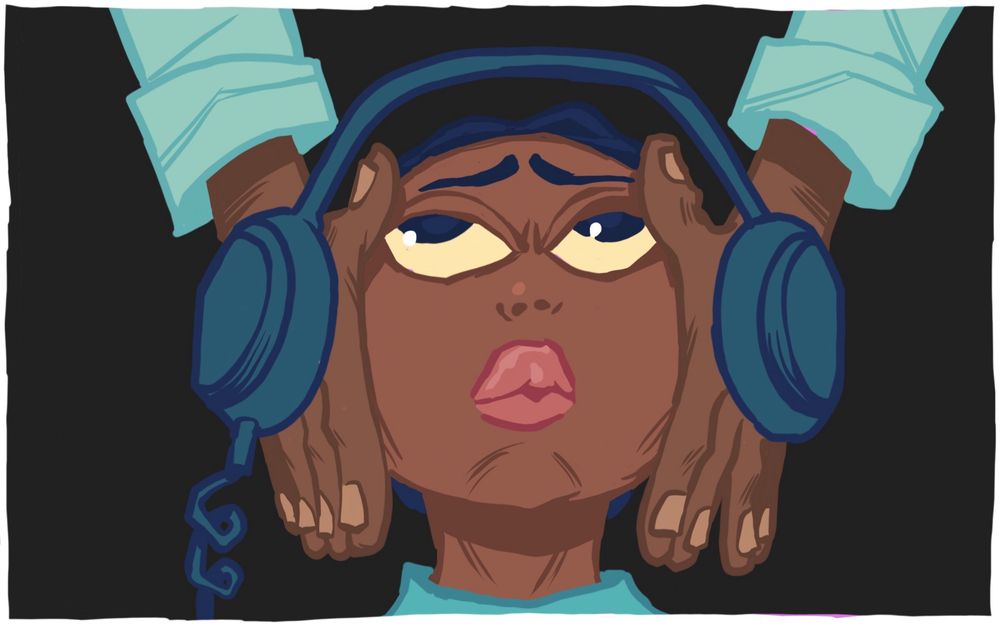Illustration: Moya Garrison-Msingwana
When I imagined myself growing old, I thought I’d become one of those parents who listened to rap music with his kids. I envisioned road trips where Aquemini, Black on Both Sides, and crunk-era hits blasted from the speakers while I told the youths about my favorite memories and what the music meant to me. I thought I’d be the cool dad, the one who listened to the same contemporary rap my kids were into, sharing in the experience and being along for the ride as they developed their own musical tastes.
Of course, in my mind, my family would be riding out to edited versions of the music, at least until they were old enough to hear all the F-words they wanted to in my presence. But there’s a problem: It’s hard to listen to rap with my kids. Unlike when I was coming up, edited rap music is much harder to come by.
When I was a kid, I had all sorts of options for cultivating my rap palate in a way that fell under the rules my parents had. This was crucial because I had to figure out my tastes on my own: By the back half of the ’90s, just as I was figuring out what music I liked, my older siblings were out of the house. And my parents were just from a generation before they had any interest in hip-hop. All they cared about was that I wasn’t listening to a bunch of curse words.
As an adult, I’ve carried on the no-cursing rule in my own house. But despite an explosion of ways to hear music — between streaming services and YouTube, any song you can imagine is at the other end of typing its name — my kids’ options are even more limited than mine were.
There were options. My days were filled with the edited music videos Joe Clair and Big Lez played on Rap City. I could find edited versions of most singles at the local record store. And when I wanted to buy a whole album with whatever saved-up allowance I hadn’t given to the comic-book store, my parents would take me to Walmart — which only sold edited CDs. I was 12 when I first heard DMX’s “Stop Being Greedy” on Rap City and bought the edited version of It’s Dark and Hell Is Hot at Walmart. Not a chance my folks would have let me listen to unedited DMX at the time. (Hell, even clean DMX wasn’t that clean.)
As an adult, I’ve carried on the no-cursing rule in my own house. But despite an explosion of ways to hear music — between streaming services and YouTube, any song you can imagine is at the other end of typing its name — my kids’ options are even more limited than mine were. With the exception of Apple Music and Tidal, which occasionally drops some good clean playlists of popular rap songs, that bottomless selection of music doesn’t usually include edited music. That’s a huge missed opportunity for getting future generations into the deeper catalogs rap has to offer.
Over the past decade or so, as physical releases and the need for radio play has declined, so has the need to produce edited versions of albums. Walmart doesn’t even sell CDs anymore. Some of it is the logistics of distributing music in the digital age: Albums are now being finalized at the 11th hour and sent directly to streaming services. Gone are the days of long marketing plans and albums being ready months before their release date, giving artists and labels the time to engineer an entire edited album. Music videos on TV are a thing of the past. Cassette singles are relics. There are a few major label exceptions like Kendrick Lamar; Jay-Z has edited versions of all of his albums available and, as a result, is a staple in our house. But he’s a rarity.
Independent artists, EPs, and smaller releases generally only come in explicit versions. Even someone like Chance the Rapper who prides himself for making uplifting music and is someone I’d love to listen to with my kids rarely does it; The Big Day is his only edited album available to stream. This year, as difficult to grapple with as it’s been, has given us hip-hop that taps into the urgency of the moment — but while I want my kids to hear it, I also want to spare them too many curse words while they’re nibbling on their fruit snacks.
Even the oldies are disappearing. Outkast’s clean music, once available to stream, is all gone. As a result, I spend most of my time with the kids listening to movie soundtracks or music that predates hip-hop — the Stevie Wonders and Whitney Houstons of the world. Obviously their music is just as essential as hip-hop, but I should be able to share rap with my kids just like I share The Temptations.
I fully understand why rappers, labels, and everyone in between would see editing music as a waste of time. And admittedly the community of parents who give a shit about the language their kids hear is probably too small to affect any rapper’s bottom line. But this is about a service that goes beyond the immediate monetary impact. It’s about giving kids the chance to steep themselves in a genre and a culture that — especially now — can make sense of the senseless. So engineers, labels, and artists: Spend a few extra hours in the studio and cut out those curse words if you can. You never know what kid’s life you might be changing.
